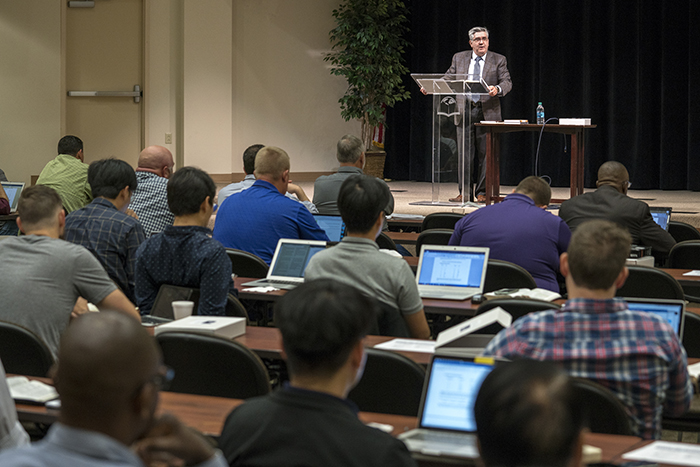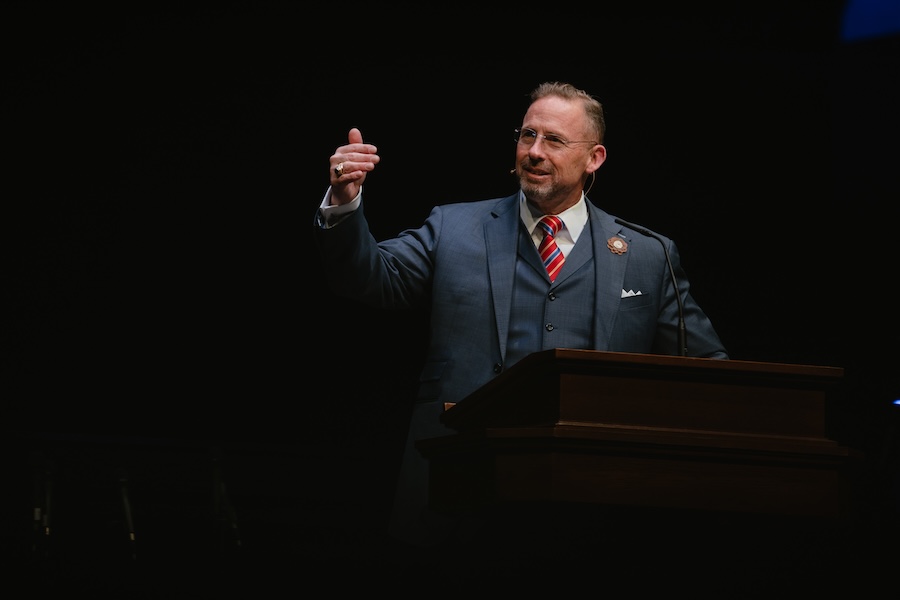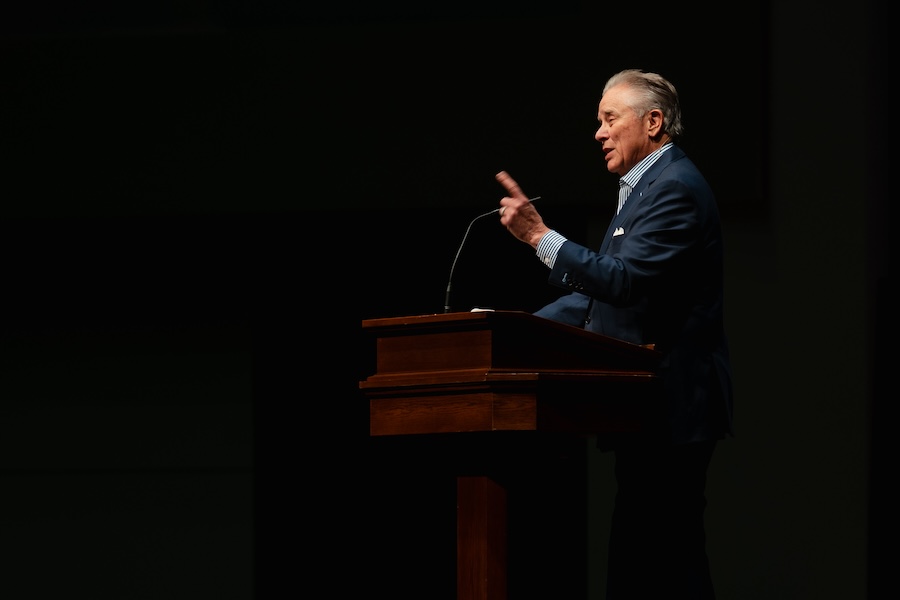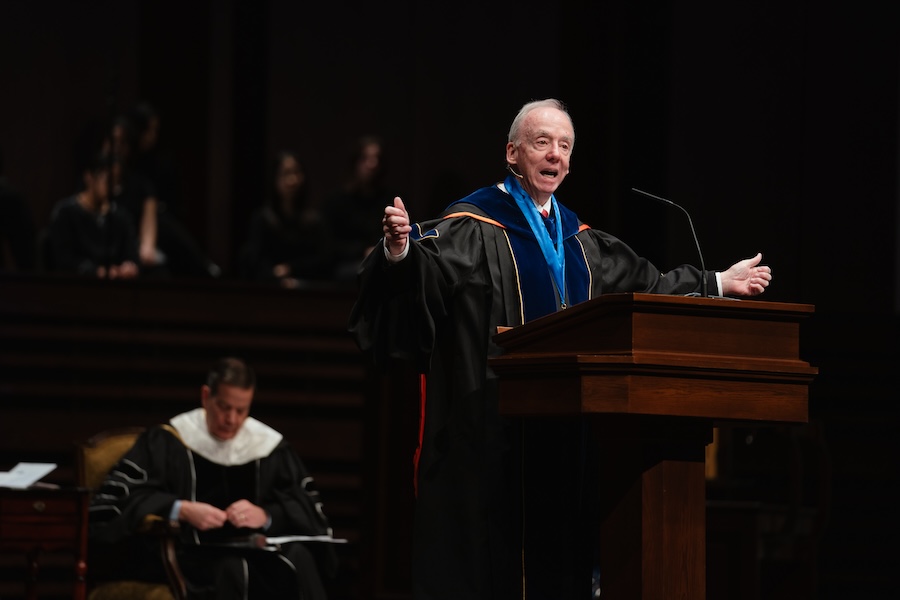Philemon ‘all about the heart of the Gospel,’ conference teaches

Comprising only 335 words in 22 sentences across six paragraphs, the New Testament book of Philemon—the third shortest book in the Bible—was the focus of this year’s Text-Driven Preaching Workshop, Oct. 9, on the campus of Southwestern Seminary. The six-member School of Preaching faculty led the day-long conference, expounding the message of the book paragraph by paragraph and deriving a message of Gospel-driven forgiveness.
Dean of the School of Preaching David Allen opened the conference, covering the first three verses of the book as well as providing background information. Though each of the book’s 25 verses received attention throughout the day, Allen cautioned against missing the overall point of the book.
“The whole is more than the sum of its parts,” Allen said. “Therefore, we want to make sure we see the forest before we start getting distracted by the individual trees in the forest.”
Allen characterized the book as Paul’s “mitigated arm-twisting” of Philemon, as Paul appeals to Philemon to forgive his runaway slave, Onesimus, who had since become a follower of Jesus Christ. The entire book, Allen said, hinges on verse 17, which contains the first imperative of the book—namely, that Philemon “accept” Onesimus as he would accept Paul. Allen said forgiveness is the major theme of the book, further stating that it is “all about the heart of the Gospel.”
Associate Professor of Preaching Matthew McKellar spoke next, covering verses 4-7. McKellar characterized this section as “the refreshment that pauses.” He explained, “Paul is pausing to reflect on the impact of Philemon’s faithfulness to Christ. And he’s doing it with a particular purpose in mind: in order to encourage Philemon toward reconciliation with Onesimus.”
Tying this message to the Gospel, McKellar said, “Because the Gospel transforms your relationship with God, you can pursue transformed relationships with others.” McKellar articulated a specific application of this passage to pastors in the room in the form of a question: “How do I get the people in my flock to do what I know God wants them to do without being a tyrant?” To answer this question, McKellar pointed to Paul’s use of grateful affirmation, thoughtful intercession, and intensified appreciation.
Covering verses 8-16, Deron Biles, associate professor of pastoral ministries and preaching, explained that this section of the book presents Paul’s strategy of persuasion—specifically, “Paul, unapologetically, making a passionate appeal to Philemon for his new brother in the Lord.”
Biles said this is relevant to preachers because they themselves have been called to appeal. “If you are not appealing, you are probably appeasing in your preaching,” Biles said. “Paul is modeling for us the necessity of appealing in our preaching.”
Biles derived four principles of persuasion employed by Paul that pastors should try to emulate. First, Biles said, an appeal must declare principle, not preference. “Our message is forged in the fire of our faithful exegesis of God’s Word, and we stand on what’s right,” Biles said. “We’re not eliciting opinion; we’re declaring truth.”
Second, appeals must draw from passion, not pressure (that is, love rather than obligation). Third, appeals demand practice, not pretense. Finally, noting that Paul, in verse 15, does not presume to know God’s will in the matter of Onesimus’ relationship with Philemon, Biles said appeals must demonstrate persuasion, not presumption.
Barry McCarty, professor of preaching and rhetoric, spoke on verses 17-20. Echoing the Gospel focus of those who presented before him, McCarty noted the parallels between Paul’s appeal for Onesimus and Christ’s appeal for believers. “Because of Christ’s relationship with the Father, he asks the Father to receive us as the Father receives Him,” McCarty said. “Everything we owed God as sinners and spiritual debtors has been charged to Christ’s account.”
Regarding application, McCarty explained, “Even though you don’t have a slave named Onesimus whom you need to free, God does expect us to behave toward other people who are under our command or under our influence or under our care … He does expect us to act toward them the way Paul is expecting Philemon to act toward Onesimus. … This is how we behave toward people, especially people who are under us in some fashion, whether they be parishioners or employees or family members—the people over whom we have influence.”
Vice President for Student Services Kyle Walker concluded the study of Philemon, covering the book’s last five verses. Speaking on verse 21, Walker said, “Paul is framing Philemon’s choice as a matter of obedience, with the implied opposite being disobedience. … The choice he has is a matter of doing what’s right in light of the Gospel.”
Framing the book’s conclusion with the notion of obedience, Walker said this obedience needs encouragement and accountability (verses 21-22), requires individual and collective efforts (23-24), and depends on grace (25). “The Gospel is for us and for our people to be obeyed even in the most mundane matters of life, and Philemon stands as an example,” Walker said. “In any situation in life, love and faith demand us to obey the imperatives of the Gospel.”
The workshop concluded with a sermon on the theology of forgiveness from Denny Autrey, dean of the J. Dalton Havard School for Theological Studies in Houston. Touching on the sacrificial system in the Old Testament and continuing with Christ’s atonement in the New, Autrey said this larger concept of redemption finds application in Paul’s letter to Philemon.
“Paul the apostle takes that same understanding of Old Testament redemption and New Testament redemption, and he brings it to this intimate letter of his dear, beloved son in the ministry Philemon, and son in the ministry Onesimus. And he says to Philemon in verse 17, ‘If you count me as a partner.’ A partner in what? A partner in the imputed righteousness we have received in Christ Jesus.”
Speaking for Paul, Autrey continued, “We stand as brothers in salvation. Hallelujah, we’ve been forgiven. As a result of that, you receive Onesimus as you have received me—as Christ has received us.”
“We were just like Onesimus,” Autrey concluded. “We were all runaway slaves; we were all useless and rebellious. And yet God extended His forgiveness to us, and now we can extend forgiveness to those we minister to.”
Next spring, Southwestern will host the Text-Driven Preaching Conference on campus, March 5-7, 2018. Plenary speakers will include Alistair Begg, Tony Merida, H.B. Charles Jr., Robby Gallaty, Dante Wright, and Abraham Kuruvilla. To learn more, visit preachingsource.com/conferences.



